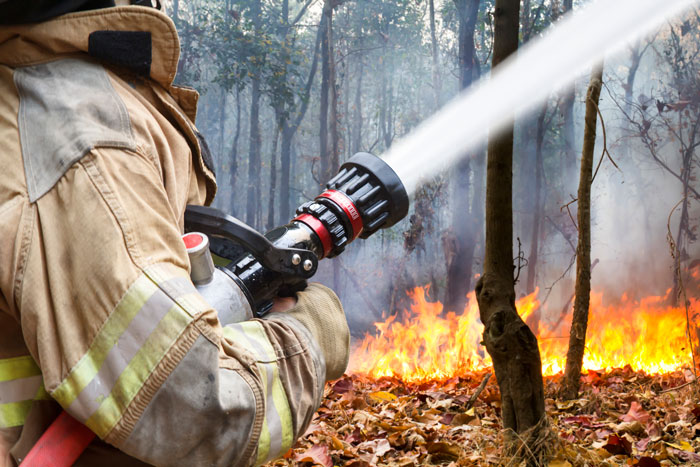
Why Park Rangers Are Smarter Than Economists: Or, Don’t Mess With Natural Cycles!
By Harry S. Dent, Jr.
Miguel Coll, a friend who is senior vice president of investments at UBS here in Puerto Rico recently sent me an article, saying, “This sounds like you!” I learned about the breakthrough insight outlined in the article, “not fighting natural fires,” decades ago. This concept was one of the first things that made me question modern economic theories.
Below, I’ve included the article excerpted from a July 12, 2016, Hirschmann Capital newsletter, sourced originally from Mark Spitznagel at Universa Investments in Miami.
Fire and Finance
History shows that both forest fires and economic crises are inevitable. In recent decades the US has averaged ~120,000 fires per year and a recession every ~4 years. Since they are inevitable, should we try to suppress them or allow them to occur naturally?
For most of the 20th century, US forest managers thought fires should always be suppressed. Starting in 1935, the US government advocated extinguishment of all fires by 10 AM the next day. By the 1940s, over 8000 fire lookout towers had been built and Smokey Bear was warning that “Only YOU can prevent forest fires.”
Policy changed as we learned that suppression increases the severity of future fires by causing tinder to accumulate. (The 1988 Yellowstone fire burned 44 times more land than any previous recorded Yellowstone fire.) Fire is now a key management tool in many US forests.
There has been no such change of heart about economic crises. For the past 30 years, we have been zealously fighting crises with bailouts, deficit spending and monetary stimulus (i.e., lower interest rates). Rate cuts were used in response to the 1987 stock market crash, 1990-91 recession, 2000-02 dot-com crash and 2007-09 recession. US bailouts aided the S&Ls (1980s-1990s), Continental Illinois (1984), Mexico (1994) and Long-Term Capital Management (1998).
Unfortunately, as with fire suppression, economic crisis suppression seems to greatly increase the severity of future crises. This is mainly because crisis suppression encourages reckless behavior by investors and borrowers…. Crisis suppression fuels stock and real estate bubbles because low rates temporarily make such assets seem more valuable. The bigger the bubble, the bigger the eventual burst and the resulting decline in wealth and spending.
Thus, the Bank of Japan’s low-rate policy after Japan’s 1985-86 recession fueled its 1986-91 stock and real estate bubbles. When these did burst, two decades of falling output and wages ensued. Crisis suppression causes debt to build up because low rates encourage borrowing and bailouts encourage careless lending. When the inevitable crisis occurs, debtors must curtail spending sharply, intensifying the crisis.
Thus, the Fed’s low-rate policy after the 2001 recession increased mortgage borrowing and fed the more severe 2007-09 recession. Central banks’ low-rate policies following the 2007-09 recession have filled the debt powder keg to its highest levels ever. Global debt to GDP has risen from its ~120% 150-year historical mean to ~200% during the housing bubble to 250% today. Crisis suppression also discourages financial firms from creating financial firebreaks that protect against others’ defaults. Hence, in recent crises, a single potential default has often threatened the entire financial system (e.g., Long Term Capital Management, Fannie Mae, Lehman Brothers, AIG, Royal Bank of Scotland, European PIGS, etc.).
Today’s extreme global debt levels undermine claims that new regulations have reduced such contagion risk. For the first time in more than 30 years, governments will probably be the source not the savior of the next crisis.
As DWGs [governments] have suppressed crises their solvency has steadily declined (e.g., government debt has soared) and many now seem highly likely to default. If lenders think a government is likely to default, it can’t suppress crises. Government bailouts lose credibility and the central bank can’t keep rates low. A “death spiral” can result, as has recently occurred in Greece and Brazil: a government debt crisis torpedoes the private sector, which in turn worsens the government debt crisis.
Thus, crisis suppression may have made a cataclysm inevitable.
Here’s my parting comment: If you don’t let the economy deleverage excessive debt and bad investments in periodic recessions, you end up with greater crises or depressions. It was no accident that after the Federal Reserve was created in 1913 to iron out natural cycles and prevent recessions, we subsequently ended up with the great 1929 bubble and 1930–1933 Great Depression 20 years later.
The present bubble has gone on much longer, reaching far greater heights than the 1929 bubble, and is much more pervasive and global…. So, do you think I’m still too bearish?
By Harry S. Dent, Jr.
Got a question or comment? You can reach us at [email protected] or call us at 904-373-8349
To view more articles from Freedom Wealth Services visit: https://freedomwealthservices.com/news/
